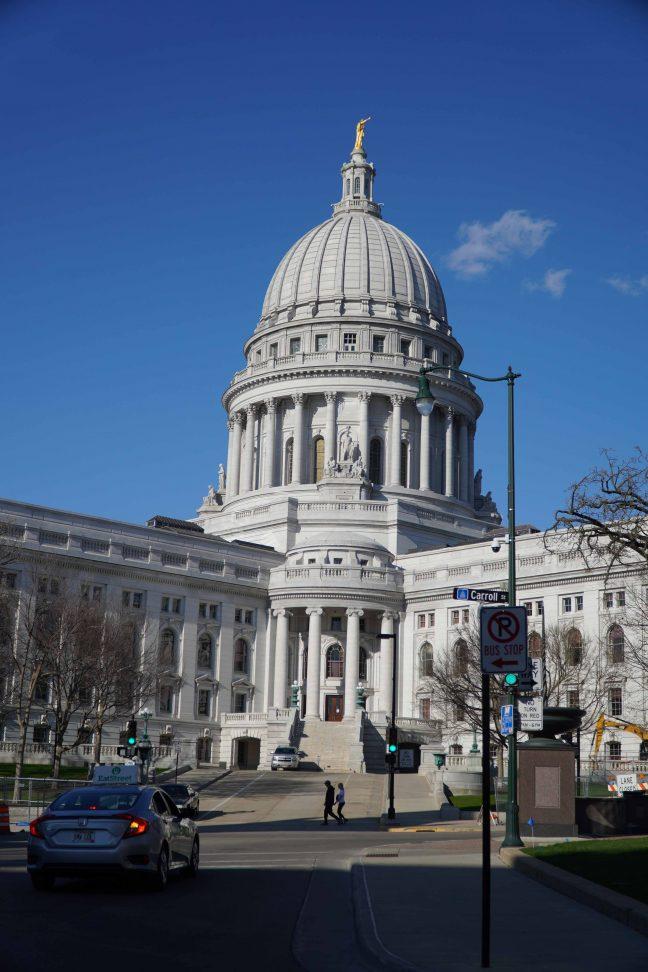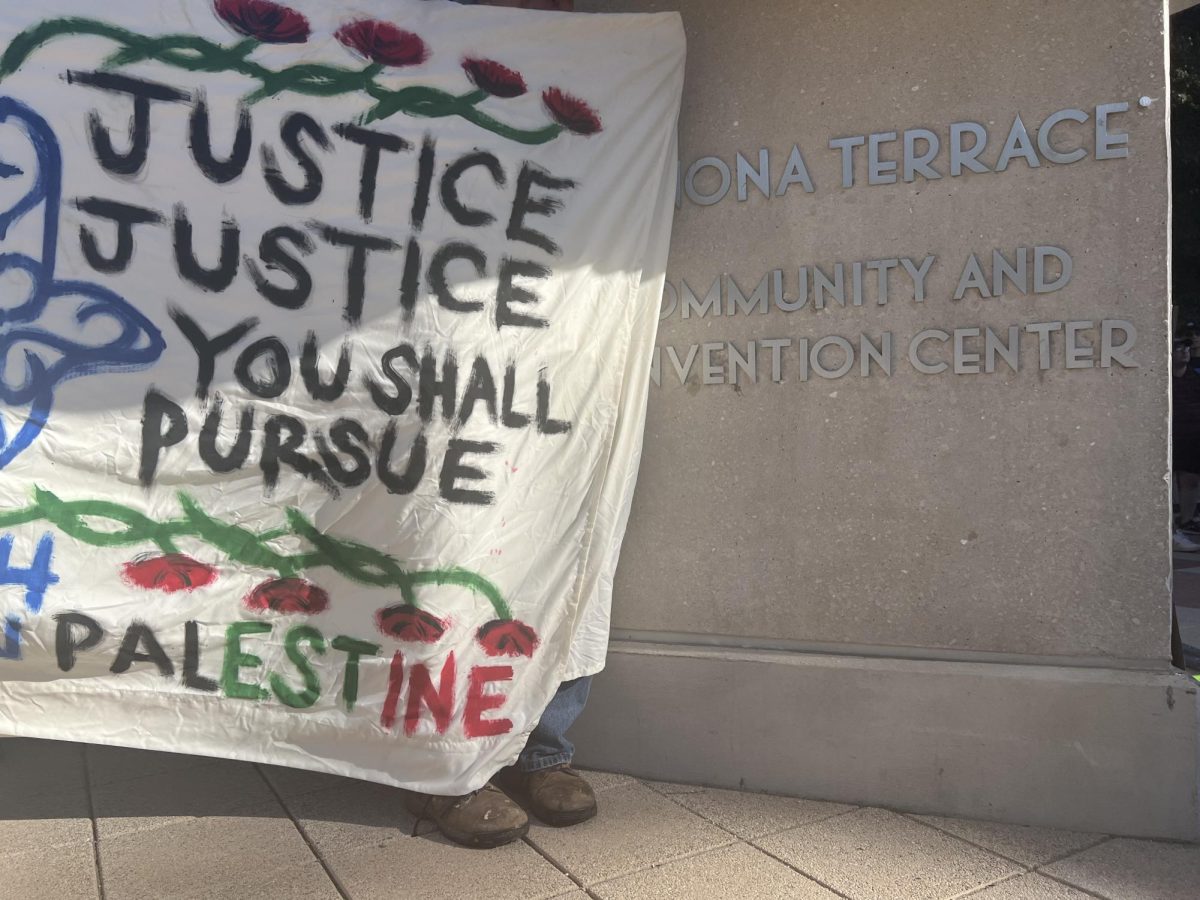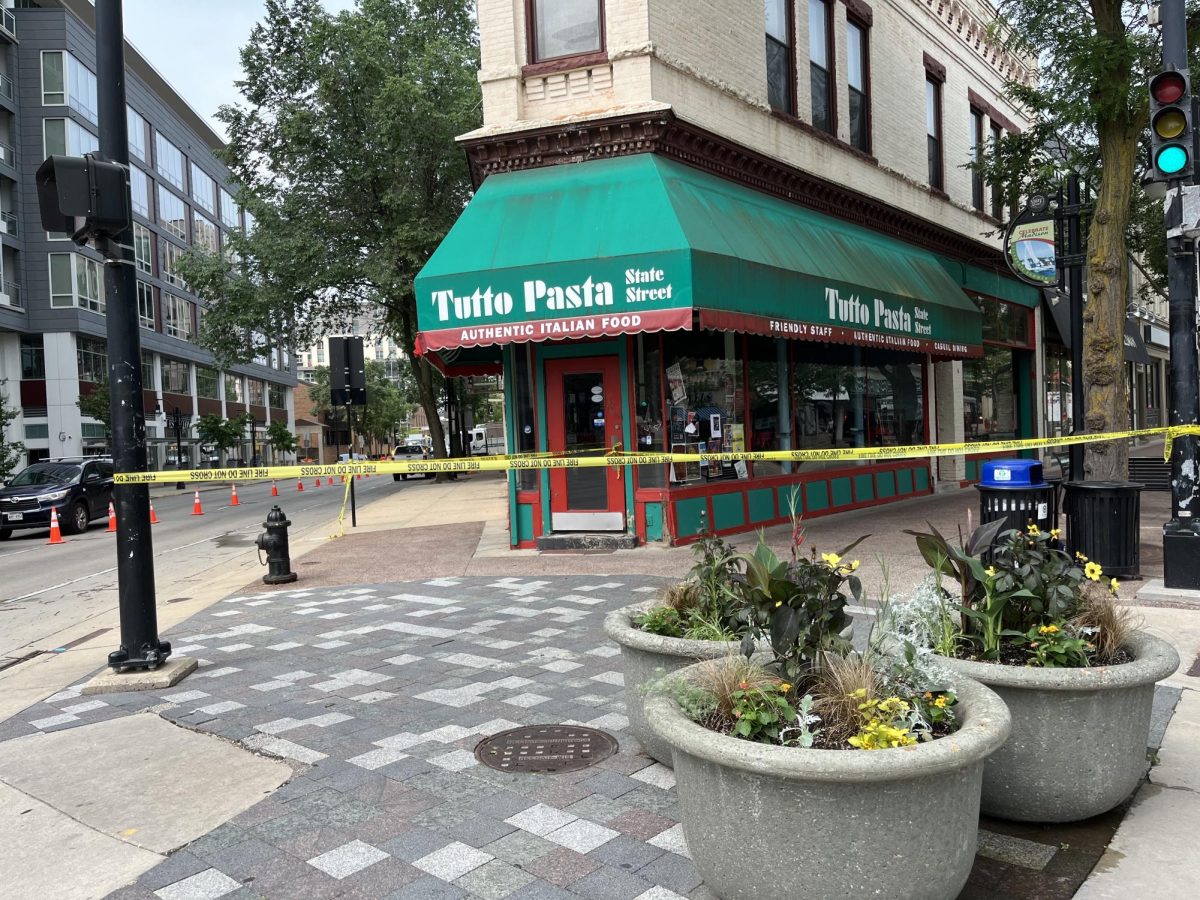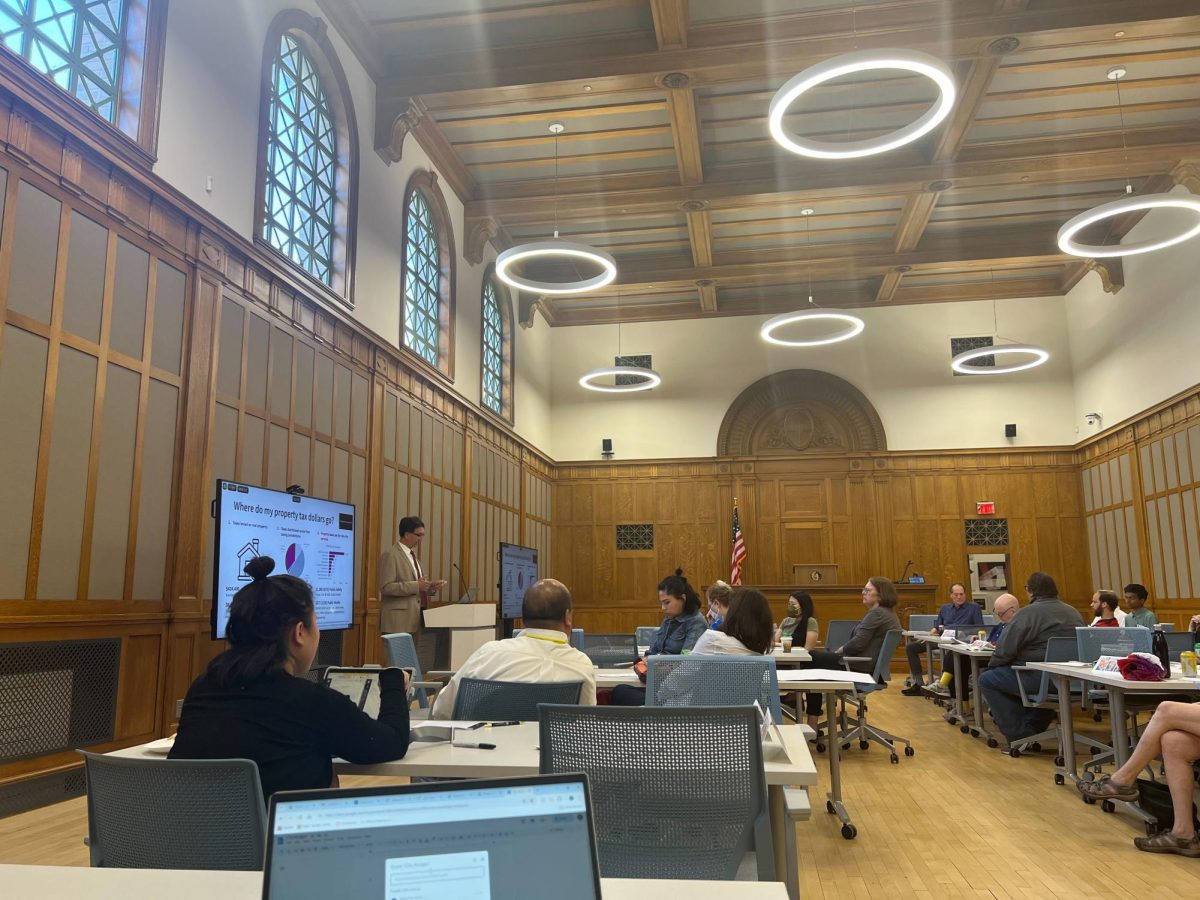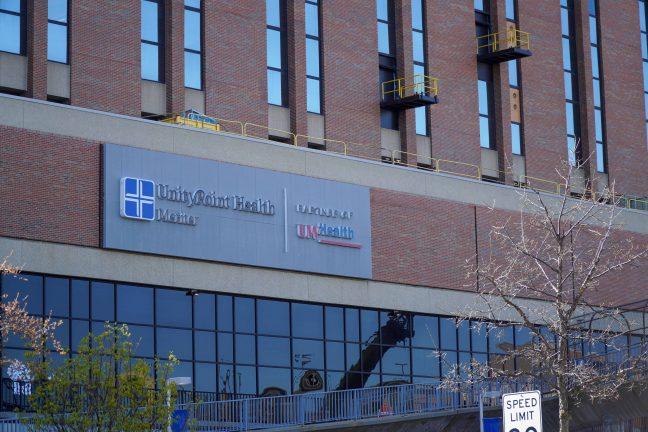Campus
Obama visits campus
For the first time in 60 years, a sitting president visited the University of Wisconsin in September, drawing a crowd of more than 25,000 people.
President Barack Obama returned to Wisconsin to garner support for the Democratic Party before the mid-term elections in November.
During his speech, Obama told the crowd how the Republicans counted on young voters not showing up at the polls, urging them to retain the spirit that propelled him into the White House in 2008.
At the time, Obama’s September visit was his sixth to Wisconsin in the past year. A native of Chicago, Obama said he spent time in Madison with friends who attended UW and always enjoyed the city.
Not all who attended fit into Library Mall, with many sitting on Bascom Hill. The line to get into the rally stretched for miles, from Park Street, down University Avenue to Charter and Linden Streets.
The last sitting president to speak at UW was Harry Truman on May 14, 1950, when he spoke at the UW Field House.
Thousands packed onto Library Mall for the event sponsored by the Democratic National Committee, enjoying music from Mama Digdown’s Brass Band, The National and Ben Harper, with speeches by Rep. Tammy Baldwin, then-gubernatorial candidate Tom Barrett and Sen. Russ Feingold. Baldwin won re-election, but both Feingold and Barrett lost to Republican opponents.
Biddy’s Badger Partnership
As part of a new option for the University of Wisconsin’s future, Chancellor Biddy Martin unveiled her plan to re-negotiate UW’s relationship with the state of Wisconsin in September.
Martin made the announcement in the September issue of Madison Magazine, holding an online chat through the magazine’s website and later a series of public forums to answer questions on the partnership.
The plan would allow for more flexibility and autonomy for UW-Madison than it currently enjoys. This would allow the school to set its own tuition, salaries, and so on, independent of the state and the Board of Regents.
Attaining these goals will not come without a price, however, and Martin said UW would need to be more accountable if the state grants it more autonomy.
UW would remain a shared governance university, with its internal structure unaffected by this restructuring.
The primary reason Martin said she wants to re-think the current partnership is to ensure UW maintains its reputation as a world-class university.
UW Foundation President Mike Knetter said UW’s relationship with the state is already different, with state exerting more control over UW than ever before.
Martin pointed to the examples set by other state institutions, such as the University of California-Berkeley and the University of North Carolina-Chapel Hill, both of which re-vamped relationships with their state governments.
Administrators at Berkeley and UNC hired outside consulting firms to evaluate the university’s efficiency, something Martin brought before the Faculty Senate in September.
A request for proposals went out in August, and firms who applied are currently being evaluated by a shared governance committee. Vice Chancellor Darrell Bazzell said the committee will forward their recommendations to Martin before the semester ends.
A set plan for renegotiating the relationship has yet to be established, primarily because elections for key government positions still needed to take place when Martin introduced the plan in September.
Since the Nov. 2 election Martin and Provost Paul DeLuca have been meeting with state officials regarding the partnership, but no information has been released yet.
City
Overture Negotiations
Earlier this year, Philadelphia-based consultant James Undecoffler said the Overture Center of the Arts was a building with costs as burdensome as New York’s Lincoln Center – the only difference being that 225,000 people live in Madison, compared with more than 8,000,000 in New York.
After a multi-million dollar donation from Madison-area philanthropist Jerry Fratuschi years ago, Overture opened in 2003 with a renovated Capitol Theater and the new, state-of-the-art Overture Hall capable of hosting Broadway-type performances.
Since opening, Overture has hosted major productions including “Wicked” and “The Lion King”, but also has faced mounting financial woes since 2008.
This summer, Mayor Dave Cieslewicz came to Madison’s City Council with a proposal from a consulting firm suggesting the city buy Overture for $1. The facility’s physical operating costs would have become part of the city’s operating budget while a new governing board would take over other costs and logistics associated with the center.
Some council members weren’t buying the proposal, prompting City Council President Mark Clear to change the game and propose a “private-private” model in November.
Not long after Clear’s proposal, Ald. Shiva Bidar-Sielaff and Ald. Chris Schmidt offered a third model in which one of Overture’s governing boards would assume ownership after “rebooting” membership and taking on a completely different composition.
With time running out before the Dec. 31 deadline to come to a decision on a model, the City Council debated into the early hours of the morning only to decide to refer the considerations to a meeting December 14.
Clear created a work group to form a fourth model immediately after the meeting. One week later, the work group proposed the model, which some members of the work group said was not ideal, and negotiated additional terms with Overture’s current governing boards and donors.
On Monday, the Overture parties and the work group announced they had assembled a fifth proposal in which a 20 to 25 member governing board would assume control of the center. The board’s membership would include private and public officials.
The council approved the fifth model in a 14-5 vote, preventing Madison’s classiest institution from going dark.
Kathleen Falk steps down
When Dane County Executive Kathleen Falk announced in October she would step down from her position after April’s general elections, Dane County suddenly plunged into a flurry of political speculation.
Within weeks of Falk’s decision, County Board Chairman Scott McDonell announced his decision to run for executive, in addition to state Rep. Joe Parisi, D-Madison, and Wisconsin Department of Commerce official Zach Brandon, who formerly served on Madison’s City Council.
Falk’s plan hit a snag shortly after her announcement. When Reid Magney, a spokesperson for the state’s Government Accountablity Board, said it would be impossible for Falk to step down in April without waiting until June for a special election, political observers throughout Dane County began to wonder when Falk would actually step out of office.
In November Falk announced McDonell would take her position at the end of the year and then appoint her to serve the remainder of his interim term. The special election will take place in April along with other municipal races.
Current Madison Mayor Dave Cieslewicz also announced this month he plans to run for his third term as mayor. Noel Radomski, a University of Wisconsin researcher in the School of Education, said he would run to challenge Cieslewicz along with additional candidates Jeremy Ryan, John Blotz, Dennis DeNure and Nick Hart.
College
Hate crimes plague UW System
Several schools across the University of Wisconsin System experienced multiple high-profile hate crimes throughout the semester.
The crimes targeted both minorities and gay students and were part of a national trend of bullying highlighted by several tragic suicides at universities and high schools nationwide.
The most startling incidents in the state came out of UW-Platteville and UW-Whitewater.
At UW-Whitewater, two women were assaulted for their perceived sexual orientation with one being called a “faggot” and then punched in the face by two male assailants. Another woman was held up against a fence and called a derogatory term by one man while another watched nearby.
Another incident at UW-Whitewater involved several cars owned by black students. Their tires were slashed and the vandals spray pained “KKK” on the cars.
UW-Platteville saw 25 incidents of racist and homophobic graffiti being spray painted on campus. The situation escalated in late November when two black student leaders’ homes were targeted with racist and threatening graffiti sprayed on their doors and windows. UW-Platteville is offering a reward and asked the FBI to help in the investigation to find the people responsible for the incidents.
Another campus that experienced multiple hate crimes was UW-Stout. Most of the crimes at Stout revolved around homophobic slurs being written on student’s dorm doors.
UW System President Kevin Reilly and all of the campus chancellors issued a statement on Nov. 23 calling for civility at all the UW campuses. In the statement the system leaders said they did not want to infringe on anyone’s freedom of speech, but they want everyone in the UW System to treat each other with respect.
They also called on students and faculty members to attend meetings and discussions to further explore these issues.
Students and faculty responded to the crimes with diversity rallies and events aimed at sending a message that hate crimes would not be tolerated their campuses. Almost 300 University of Wisconsin students and administrators held a “Stop the Silence Vigil” in late October to show support for students who had committed suicide and others who had been harassed.
No one has been arrested or identified in any of the crimes at UW-Whitewater or UW-Platteville.
Campus Services Fund introduced
The student government sparked interest this semester with the idea to create a new way of funding vital services on campus.
Matt Manes, chair of ASM’s Student Services Finance Committee, proposed creating the Campus Services Fund early in the semester.
The new fund would support services the Student Council deemed vital to the campus like tutoring, legal counsel for students and sexual assault support.
The CSF was endorsed by SSFC after several informational sessions and some debate.
However, when it moved on to the Student Council it was met by strong opposition, with students filling up the room and the speakers list for two weeks in a row in November. One meeting had more than 100 students pack into the Student Activity Center meeting room.
The students criticized ASM for not being transparent and not involving students in the CSF decision process. They also expressed concerns the CSF would take money away from the General Student Services Fund, which is reserved for student organizations which meet special requirements.
The Student Council voted to move the CSF to the Rules Committee where they can work to improve the fund and hear more student input next semester. Manes has hinted he may try to subvert the Student Council and implement portions of the plan through other methods.
State
Republicans sweep elections
Election season this year was a rough one for Democrats.
In a campaign cycle marked largely by increased conservative grassroots involvement, Republicans in Wisconsin and around the country enjoyed broad sweeps in the midterm election.
In Wisconsin, Republicans gained the governorship, both chambers of the state Legislature and a U.S. Senate seat. Nationally, Republicans gained control of the House of Representatives.
Although Democrats lost big in the state, it probably wasn’t due to a lack of effort. President Barack Obama visited Wisconsin no less than six times to stump for various Democratic candidates. Michelle Obama and Vice President Joe Biden also made campaign visits to the state.
The election was also marked by a slew of political outsiders who made plays for government office, the most notable in Wisconsin being Ron Johnson, an Oshkosh plastics manufacturer.
Johnson distinguished himself by entering the Senate race against incumbent Sen. Russ Feingold, D-Wis., less than a week before the Republican caucus but still winning over 90 percent of the party’s endorsement. Johnson managed to unseat the 17-year senator by a wide margin, using his personal fortunate to overtake the senator on Election Day.
As many Wisconsinites can attest, the Feingold-Johnson Senate race itself was also defined by the amount of advertising run throughout the state. The race also helped earn Wisconsin the dubious honor of running more Senate campaign TV ads than any other state.
In a closely fought gubernatorial race, Republican Scott Walker and Democrat Tom Barrett vied for exiting Gov. Jim Doyle’s seat, who did not run for reelection.
Barrett, the mayor of Milwaukee, worked to distinguish himself from Doyle, but the campaign was largely defined by the increasingly negative campaign tactics of both sides. Ultimately, Walker beat Barrett by a healthy margin, and began working almost immediately to safeguard his campaign goals in the months before his inauguration, scheduled for Jan.3.
Even before taking office, Walker has managed to kill the high-speed rail project, espousing plans to redirect the funds toward other infrastructure projects, which eventually lead to the U.S. Department of Transportation redistributing the rail money to projects in other states.
Walker also sent a letter requesting Doyle refrain from making any other decisions as governor that might hinder Walker’s ability to tackle the state’s nearly $3.3 billion budget deficit when designing the next biennium budget.
Ken Kratz steps down after scandal
In the category of morbidly fascinating news, one incident certainly made a name for itself: The case of the “sexting” district attorney.
Disgraced Calumet County DA Ken Kratz resigned Oct. 4 after allegations surfaced that he had sent inappropriate sexual text messages to an abuse victim whose boyfriend he was prosecuting for trying to strangle her to death.
Kratz, 51, sent 20 texts messages over a two-day period to Stephanie Van Groll, 26, in Nov. 2009 including one where he called her a “young, hot nymph.” Van Groll eventually reported him to the police, though the state Office of Lawyer Regulation failed to find Kratz guilty of any professional misconduct.
After initially vowing to remain Calumet’s DA, which is an elected position, other women came forward with stories of Kratz allegedly abusing the authority of his position.
Another abuse victim claimed he had sexually harassed her while prosecuting her case, while another woman claimed Kratz sent her sexual text messages while he was promoting a pardon for her on a past drug charge.
Another woman claimed Kratz invited her to the autopsy of a woman who had been killed by her boyfriend, but only if she went as his date.
Ultimately, Kratz resigned the day before a state trial against him spearheaded by both Gov. Jim Doyle and Attorney General J.B. Van Hollen’s office. He is currently receiving treatment for an undisclosed medical condition at an undisclosed facility outside of Wisconsin.
Doyle appointed Jerilyn Dietz to replace Kratz on Dec. 3. She will begin in the position on Monday, Dec. 19, and serve until Jan. 7, 2013.








